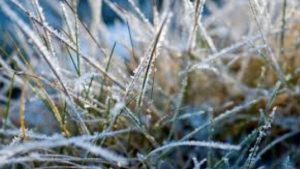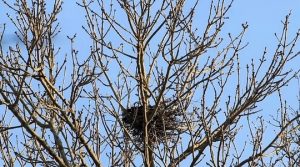Camp is settling in for its long winter’s rest. It’s quite beautiful though different, to walk the land now. The dried grass sparkles with frost in the sunlight. Most of the trees are bare, with the exception of the Oaks who hold their dead leaves until into the winter. All the trees have settled into their resting time. To survive the cold, they have become “dormant”, a significant slowing of their growth and energy consumption. The gift of the leafless trees is seeing so many birds’ nests that were hidden in the canopy all summer. Our beautiful ferns, which are so prolific during the warmer months, have died back showing just their short brown stalks topped by seedpods. There are places on the paths where you can see ice crystals pushing their way above the surface as the annual ground freeze begins. The lake is still open water but it has undergone its “turnover”, when the warmer oxygen-filled surface layer, cools and sinks to the bottom. This begins the vital process of re-oxygenating and bringing nutrients to the deep cold water. Soon the lake will freeze, and everything underneath will rest.
Animals are also preparing for the winter. The porcupine that was seen in the Apple Tree field is active in the winter but has fattened up and grown a thicker under-layer of fur. Even the porcupines’ quills help to insulate them from the cold and wind, so you might just see a porcupine at this time of year. You won’t see our woodchucks – they are true hibernators, and you won’t hear our Loons as they have migrated to the open water of the ocean. However, one animal you will see scurrying about through winter, are the squirrels. They’ve had a banner year storing up caches of one their favorite foods – acorns from all of our Oak trees.
Soon the snow will cover the land, and then the long winter’s rest will truly begin.


